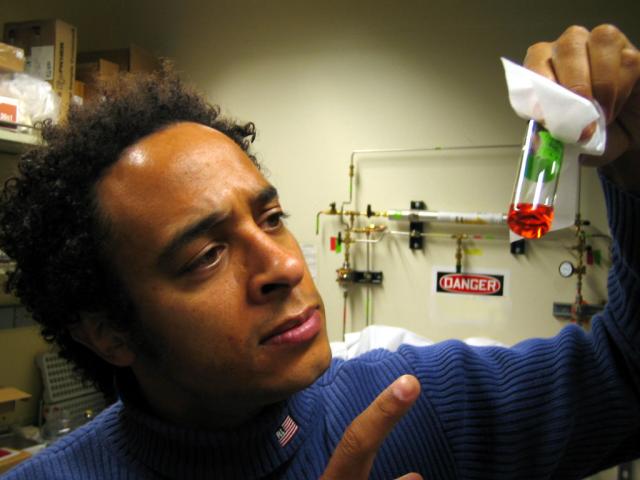Abstract: Magic-sized clusters (MSC) are identical CdS inorganic cores that maintain a closed-shell stability, inhibiting conventional growth processes. Because MSCs are smaller than nanoparticles, they can mimic molecular-level processes, and because of their small size and high organic-ligand/core ratio, MSCs have “softer” inter-particle interactions, with access to a richer phase diagram beyond the classical close packed structures seen with larger particles. In this talk I will highlight some remarkable behavior we have recently found in their ability to isomerize and their ability to self-organize into hierarchical assemblies with optical activity. We have found that MSCs have the ability to undergo a chemically-induced, reversible isomeric transformation between discrete states. The diffusionless reconfiguration of the inorganic core follows a first order kinetic rate driven by a distortion of the ligand binding motifs. Recently we have uncovered new intermediate states with smaller bandgaps. Additionally, these MSCs display a surprising ability to self-organize into films with hierarchical assembly that spans over seven orders of magnitude in length scale. Meniscus-guided evaporative assembly of these nanoclusters results in large-scale homochiral domains with anisotropy values (g-factors) near 0.15 and domains surpassing 6 mm2. These g-factors are among the highest reported for all semiconductor particles. Through Mueller matrix polarimetry spatial mapping we unravel the mechanism behind the formation of the self-organized chiral domains. Our hypothesis is that the fibrous nanocluster hybrid materials undergo pinning and twisting under fluid flow, leading to helical assemblies. Beyond optical properties, the multiscale self-organization behavior of these MSCs displays similarities to biosystems, providing a new platform for the design and study of materials. References JACS 140, 3652 (2018) DOI: 10.1021/jacs.5b10006 Science 363, 731 (2019) DOI: 10.1126/science.aau9464 Nat. Mat. 21, 518 (2022) https://doi.org/10.1038/s41563-022-01223-3 ACS Nano 16, 20457 (2022) https://doi.org/10.1021/acsnano.2c06730 Chirality 35, 846 (2023) https://doi.org/10.1002/chir.23597 Bio: Prof. Richard Robinson received his PhD in Applied Physics from Columbia University, and was a postdoctoral fellow at University of California, Berkeley/LBNL in the research group of Paul Alivisatos. In 2008 Richard began a faculty position at Cornell University in the Materials Science Department, and is currently an associate professor. His primary research interests are: (I) Synthesis and chemical transformations in nanocrystals, (II) Nanocrystals in energy applications, and (III) Synchrotron x-ray characterization of nanomaterials. Robinson’s work has been recognized with awards including the Journal of the American Chemical Society Young Investigator selection, the NSF CAREER award, the Fulbright scholar fellowship, the 3M Faculty Award, and the R&D 100 Award. His papers have been highlighted in journals like Physics Today, Scientific American Israel, and the Journal of Materials Chemistry A, where he was chosen for the inaugural “Emerging Investigators” issue, and he was a featured speaker for PBS NOVA’s Secret life of Scientist series.
References
- JACS 140, 3652 (2018) DOI: 10.1021/jacs.5b10006
- Science 363, 731 (2019) DOI: 10.1126/science.aau9464
- Nat. Mat. 21, 518 (2022) https://doi.org/10.1038/s41563-022-01223-3
- ACS Nano 16, 20457 (2022) https://doi.org/10.1021/acsnano.2c06730
- Chirality 35, 846 (2023) https://doi.org/10.1002/chir.23597
Bio: Prof. Richard Robinson received his PhD in Applied Physics from Columbia University, and was a postdoctoral fellow at University of California, Berkeley/LBNL in the research group of Paul Alivisatos. In 2008 Richard began a faculty position at Cornell University in the Materials Science Department, and is currently an associate professor. His primary research interests are: (I) Synthesis and chemical transformations in nanocrystals, (II) Nanocrystals in energy applications, and (III) Synchrotron x-ray characterization of nanomaterials. Robinson’s work has been recognized with awards including the Journal of the American Chemical Society Young Investigator selection, the NSF CAREER award, the Fulbright scholar fellowship, the 3M Faculty Award, and the R&D 100 Award. His papers have been highlighted in journals like Physics Today, Scientific American Israel, and the Journal of Materials Chemistry A, where he was chosen for the inaugural “Emerging Investigators” issue, and he was a featured speaker for PBS NOVA’s Secret life of Scientist series.
Speaker:
Institution:
Location:

